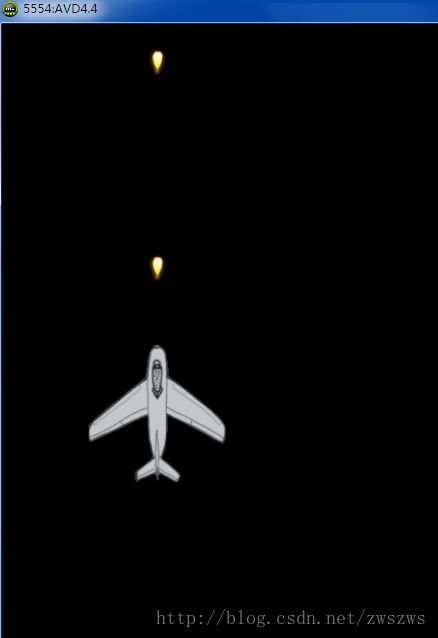第三十九天 一乐在其中—Android的小游戏打飞机(三)让子弹飞
8月7日,小雨。“乳鸦啼散玉屏空,一枕新凉一扇风。睡起秋色无觅处,满阶梧桐月明中。”
上篇已经让飞机随手指自由移动,本篇加载子弹和音效及背景音乐。
本篇要用到的几个函数讲解:
一、cocos2d的音效、背景音乐函数如下:
1、SoundEngine.sharedEngine().playSound(Context ctxt, int resId, boolean loop)
用于播放背景音乐。
用于播放音效,如子弹射击、碰撞、爆炸等音乐效果。
3、SoundEngine.sharedEngine().realesAllSounds();
SoundEngine.sharedEngine().realesAllEffects();
清理所有的音效-Clean everything up
SoundEngine.purgeSharedEngine();
完全关闭音响系统-Completely shut down the sound system
二、单线程的定时器schedule
schedule(String selector,float interval)
第二个参数的意思是,每隔多少秒执行一次函数,记住,单位是秒。
为了使游戏变得更加有趣,我们会随着时间连续不断地发射一些精灵出来。可以使用cocos2d的定时scheduler,并指定一个回调函数来完成此功能。一秒钟或半秒调用一次回调函数就可以了。
三、action
cocos2d里面提供了许多非常方便的内置的action,你可以使用这样action来让你的精灵动起来。比如move action,jump action,fade action,animation action(就是播放图片序列)等。这里,我们对目标对象子弹使用了3种类型的action:
- CCMoveTo: 我们使用CCMoveTo.action让子弹移动到屏幕的上端,直到移出屏幕。注意,这里我们可以指定这个过程要花费多长时间。这里使用了变化的时间间隔2-4秒。
- CCCallFuncN: 它可以让你为某个执行此action的对象指定一个回调函数。我们指定的回调函数是:onBulletMoveToFinished。
- CCSequence: 它允许我们把一系列的action组成一个action序列,并且这些acton可以按顺序执行。一次执行完所有的action。
四、
package edu.eurasia.cocos2d_game03;
import org.cocos2d.layers.CCScene;
import org.cocos2d.nodes.CCDirector;
import org.cocos2d.opengl.CCGLSurfaceView;
import org.cocos2d.sound.SoundEngine;
import android.os.Bundle;
import android.app.Activity;
import android.view.Window;
import android.view.WindowManager;
public class MainActivity extends Activity {
// 创建一个view对象,cocos2d引擎会把图形绘制在该view对象上面
private CCGLSurfaceView view = null;
@Override
protected void onCreate(Bundle savedInstanceState) {
super.onCreate(savedInstanceState);
// 不显示标题栏
requestWindowFeature(Window.FEATURE_NO_TITLE);
// 设置当前程序全屏显示
getWindow().setFlags(WindowManager.LayoutParams.FLAG_FULLSCREEN,
WindowManager.LayoutParams.FLAG_FULLSCREEN);
// 设置不允许屏幕自动休眠
getWindow().setFlags(WindowManager.LayoutParams.FLAG_KEEP_SCREEN_ON,
WindowManager.LayoutParams.FLAG_KEEP_SCREEN_ON);
view = new CCGLSurfaceView(this);
setContentView(view);
// 获取导演对象
CCDirector director = CCDirector.sharedDirector();
// 设置游戏引擎画面的输出目标View
director.attachInView(view);
// 设置游戏是否显示FPS值
// director.setDisplayFPS(true);
// 设置游戏的刷新率 FPS = frame per second
director.setAnimationInterval(1 / 60.0f);
// 生成场景对象
CCScene scene = CCScene.node();
// 生成图层对象
PlaneLayer layer = new PlaneLayer(this);
// 将图层添加至场景当中
scene.addChild(layer, 1);
// 通知导演,运行场景
director.runWithScene(scene);
}
@Override
protected void onDestroy() {
super.onDestroy();
//清理所有的音效
SoundEngine.sharedEngine().realesAllSounds();
SoundEngine.sharedEngine().realesAllEffects();
// 完全关闭音响系统
SoundEngine.purgeSharedEngine();
}
}
五、package edu.eurasia.cocos2d_game03;
import java.util.ArrayList;
import java.util.List;
import org.cocos2d.actions.instant.CCCallFuncN;
import org.cocos2d.actions.interval.CCMoveTo;
import org.cocos2d.actions.interval.CCSequence;
import org.cocos2d.layers.CCLayer;
import org.cocos2d.nodes.CCDirector;
import org.cocos2d.nodes.CCSprite;
import org.cocos2d.sound.SoundEngine;
import org.cocos2d.types.CGPoint;
import org.cocos2d.types.CGRect;
import org.cocos2d.types.CGSize;
import android.content.Context;
import android.view.MotionEvent;
public class PlaneLayer extends CCLayer {
// 声明一个精灵对象
private CCSprite plane;
private CCDirector director;
private CGSize winSize;
private CGPoint offset;
private boolean flag = false;
// 定义子弹的速度为每秒500像素
private float bulletSpeed = 500;
private Context context;
private List<CCSprite> bullets = new ArrayList<CCSprite>();
public PlaneLayer(Context context) {
super();
this.context = context;
// 设置当前图层是否接受触摸事件
this.setIsTouchEnabled(true);
director = CCDirector.sharedDirector();
winSize = director.winSize();
// 初始化精灵对象
plane = CCSprite.sprite("p.png");
// 设置精灵对象的位置
plane.setPosition(CGPoint.ccp(winSize.width / 2, 200));
this.addChild(plane);
// 定时器schedule
schedule("addBullet", 0.5f);
// 背景音乐
SoundEngine.sharedEngine().playSound(context, R.raw.game_music, true);
}
// 当用户开始触摸屏幕,执行该方法
@Override
public boolean ccTouchesBegan(MotionEvent event) {
CGPoint point = director.convertToGL(CGPoint.ccp(event.getX(),
event.getY()));
CGRect rect = plane.getBoundingBox();
flag = CGRect.containsPoint(rect, point);
if (flag) {
offset = CGPoint.ccpSub(plane.getPosition(), point);
}
return super.ccTouchesBegan(event);
}
// 当用户手指离开屏幕时,执行该方法
@Override
public boolean ccTouchesEnded(MotionEvent event) {
flag = false;
return super.ccTouchesEnded(event);
}
// 当用户手指在屏幕移动时,执行该方法
@Override
public boolean ccTouchesMoved(MotionEvent event) {
if (flag) {
CGPoint point = director.convertToGL(CGPoint.ccp(event.getX(),
event.getY()));
point = CGPoint.ccpAdd(point, offset);
plane.setPosition(point);
}
return super.ccTouchesMoved(event);
}
public void addBullet(float delta) {
// 生成一个子弹精灵对象
CCSprite bullet = CCSprite.sprite("bullet.png");
// 将子弹对象添加至图层当中
this.addChild(bullet);
// 将新添加的子弹对象放置在bullets集合当中
bullets.add(bullet);
// 获得精灵的大小,getContentSize函数来获得节点原始的大小
CGSize planeSize = plane.getContentSize();
CGSize bulletSize = bullet.getContentSize();
CGPoint initPos = plane.getPosition();
// 子弹的y轴的初始位置
initPos.y = initPos.y + planeSize.height / 2 + bulletSize.height / 2;
bullet.setPosition(initPos);
// 创建一个代表坐标的对象
CGPoint targetPos = CGPoint.ccp(initPos.x, winSize.height);
// 计算两个坐标点之间的距离,计算子弹运行的距离
float distance = CGPoint.ccpDistance(initPos, targetPos);
// 计算子弹运行的时间
float t = distance / bulletSpeed;
// 生成一个动画对象,让子弹移动到屏幕的上端
CCMoveTo moveTo = CCMoveTo.action(t, targetPos);
// 生成一个动作对象,该动作执行时,将会调用当前对象的onBulletMoveToFinished方法
// CCCallFuncN:
// 它可以让你为某个执行此action的对象指定一个回调函数。我们指定的回调函数是:onBulletMoveToFinished
CCCallFuncN func = CCCallFuncN.action(this, "onBulletMoveToFinished");
// CCSequence:
// 它允许我们把一系列的action组成一个action序列,并且这些acton可以按顺序执行。一次执行完所有的action。
CCSequence seq = CCSequence.actions(moveTo, func);
// 通知精灵执行动作
bullet.runAction(seq);
// 子弹声效
SoundEngine.sharedEngine().playEffect(context, R.raw.bullet);
}
public void onBulletMoveToFinished(Object sender) {
if (sender instanceof CCSprite) {
CCSprite sprite = (CCSprite) sender;
// 将子弹对象从集合中移除
bullets.remove(sprite);
// 将子弹对象从屏幕中移除
this.removeChild(sprite, true);
}
}
}
六、
源代码下载地址:http://download.csdn.net/detail/zwszws/7731459